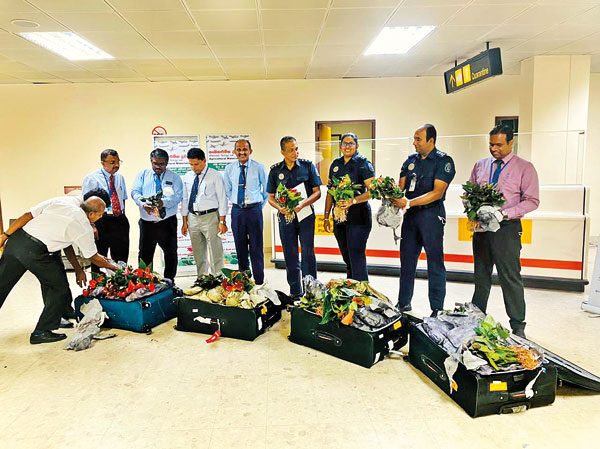News
Anthurium smugglers pose biosecurity risks
View(s):By Kasun Warakapitiya
Environmentalists and farmers are worried that dangerous pathogens and pests may be introduced into the country through commercial and ornamental plant smugglers who evade quarantine at entry points.
Endemic species could be in danger.
Vegetable farmers, house plant enthusiasts who sell ornamental flower plants and those who locally produce new hybrids fear their livelihoods would be destroyed.
These concerns emerged as customs on Monday detected two Sri Lankans who smuggled Rs 10 million worth of Anthurium plants.
The Customs media spokesman and deputy director, Sudattha Silva said that the two arrived from Bangkok, Thailand on Sri Lankan Airlines flight UL 405. The passengers had not declared the goods and also violated quarantine regulations.

Customs officials with the Rs 10 million worth of Anthurium plants. Pic by T.K. G. Kapila
Mr Sudattha said the suspects and the plants were handed over to the Bandaranaike International Airport (BIA) plant quarantine unit.
Former deputy director of customs, as well as founder of the Customs’ Biodiversity Protection Unit (BPU) Samantha Gunasekara, told the Sunday Times that the incident had been mishandled or deliberately set up to help the smugglers.
He said customs should investigate, interrogate and take action against the smugglers and find out who orchestrates such smuggling.
Customs officers can take action against smugglers for bringing in a plant included in the prohibited list, for not declaring goods to customs, bringing a commercial quantity, and for passenger baggage violations.
He explained that apart from that, the individuals had also violated international plant quarantine regulations, and international plant variety rights regulations.
“Agriculture ministry regulations, too, are violated as Anthurium plants are listed as a prohibited plant. The reason for the prohibition of the plant importation came as the stem of the plant can harbour fungi, harmful pathogens and pests,’’ he said.
Smuggled plants must be destroyed and violators of the law must be fined, he said.
The Sunday Times has learned that some new varieties of Anthuriums produced by countries such as The Netherlands retain rights over producing certain varieties of those plants.
Mr Gunasekera said there is a ban on Anthurium plants. These are sought after by collectors, and plant enthusiasts. Certain varieties sell for between Rs 50,000 and Rs 100,000.
Farmers expressed concern over non-quarantined plants entering the country. They said that apart from environmental damage, the illegally imported plants could have parasites, bacteria and fungi which could destroy local cultivations.
All-Island Farmers Federation (AIFF) secretary, T.B. Sarath said that even the food security could be threatened if harmful diseases spread to cultivations.
He said that though this does not happen immediately, the consequences could be serious.
Environmentalists, too, expressed fears over new invasive pests and the destruction of native biodiversity due to pathogens which can spread to local plant life through non quarantined plants.
Environmentalist as well as the convener of the Biodiversity Conservation and Research Circle, Supun Lahiru Prakash, said plant quarantine ensures that pathogens, pests as well as diseases will not be introduced into the country.
U.D Amila Lakmal Ratnayake who is carrying on plant tissue culture and selling anthurium and orchids explained that when imported species are released into the market without quarantine, pathogens and pests could be introduced.
He explained that he had spent over a year producing tissue culture plants to the market.
“Even though we can produce a six inch plant for Rs 150, when larger imported plants are available in the market, people tend to purchase even at high prices.’’
The secretary of the All Island Anthurium Cultivators Association, Chamila Niroshani Fernando said a few businessmen are smuggling in Anthurium bushes with the support of influential people.
She said that 300,000 local Anthurium growers are bankrupt as they are unable to sell their plants due to the foreign varieties in the market. Meanwhile, the director general of the Peradeniya Botanical Gardens, S.A Krishna Raja said imports of a few varieties of Anthuriums have been allowed to create genetically strong new varieties. However, she said she had heard of smuggling.
The director general of the Agriculture Department, Dr Ajantha de Silva told the Sunday Times that the 98 kilograms of Anthurium plants handed over to the BIA plant quarantine division, will be destroyed.
The best way to say that you found the home of your dreams is by finding it on Hitad.lk. We have listings for apartments for sale or rent in Sri Lanka, no matter what locale you're looking for! Whether you live in Colombo, Galle, Kandy, Matara, Jaffna and more - we've got them all!

